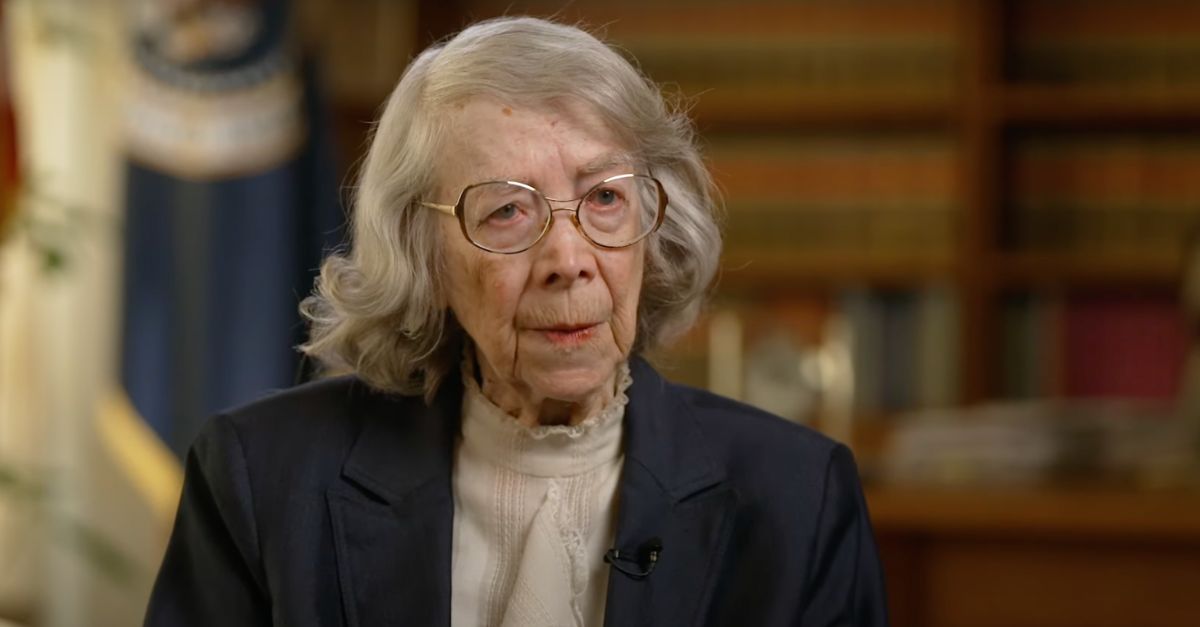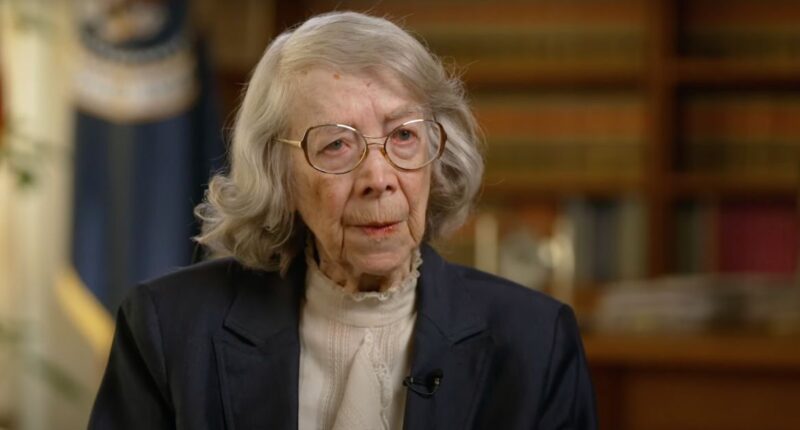
U.S. Circuit Judge Pauline Newman, 96, was suspended from hearing cases after the Judicial Council of the Federal Circuit unanimously found that the judge’s refusal to submit to a mental examination was improper. Newman, a Ronald Reagan appointee, was, until the council’s order, the oldest federal judge still on the bench. (Screengrab via Youtube).
Pauline Newman, the oldest judge on the federal bench at age 97, continues to fight her suspension over mental health concerns — and she is now seeking to unseal documents relating to the accusations against her.
Newman was appointed in 1984 by President Ronald Reagan and was the first judge appointed directly to the Federal Circuit where she “served with distinction” for almost 40 years. The judge, however, has refused to cooperate with an investigation into her mental health after her judicial colleagues reported concerning behaviors, delays in completing work, and habitual confusion.
The Committee on Judicial Conduct and Disability conducted an investigation into Newman’s mental capacity and found “overwhelming evidence” of the judge’s memory loss, lack of comprehension, and confusion. The committee determined that the judge was often “frustrated, agitated, belligerent, and hostile towards court staff,” and directed her to undergo a 30-45 minute interview with a neurologist and a full neuropsychological examination.
Newman refused, and the committee responded with a suspension order that blocked Newman from receiving any new case assignments.
Newman next sued Chief Circuit Judge Kimberly A. Moore and all the other Federal Circuit judges on the committee. Newman was represented in the lawsuit by New Civil Liberties Alliance (NCLA), a public-interest law firm linked to conservative backers that focuses on the so-called “administrative state.” U.S. District Judge Christopher R. Cooper, a Barack Obama appointee, threw out most of Newman’s lawsuit in February, then dismissed the entire case on the pleadings in July. In his 15-page ruling, Cooper did not focus the factual allegations against Newman. Rather, the ruling was confined primarily to rejecting the legal challenges Newman had raised to the Judicial Conduct & Disability Act itself.
Newman, via counsel, appealed the ruling Monday, and argued to the U.S. Court of Appeals for the District of Columbia Circuit that, “Though advanced in age, Judge Newman retains her sharp intellect,” and both lay and expert witnesses have described her as an “unusually cognitively intact … woman” whose cognitive and physical abilities make her appear “20 or more years younger than her stated age.”
In the appellate brief, Newman’s counsel said the judge was in sound mental and physical health, and argued that the only reason Newman was late in submitting written opinions is that “she takes extraordinary pains to ensure that her opinions fully reflect her views and remain consistent from case to case and year to year.”
Greg Dolin, who has represented Newman throughout the case, said in Dec. 5 statement that “[t]he entire disciplinary process against Judge Newman was always factually baseless and legally meritless,” and encouraged the D.C. Circuit to “put a stop to the Federal Circuit Judicial Council’s unconstitutional and ultra vires actions against Judge Newman.”
On the same day Newman’s appeal was filed, she also filed a motion to unseal documents related to the committee’s investigation and findings that are subject to a Dec. 4 gag order. In the motion, Newman’s legal team said that the defendants in the case — Newman’s judicial colleagues — have refused to abide by rules of judicial conduct, have “threatened Judge Newman and her counsel with unspecified sanctions” for making documents public, and have “sought to direct the process within their own forum” in an “entirely inappropriate effort” to contradict the law.
In an email Tuesday, Newman’s co-counsel John J. Vecchione said:
The Judicial Counsel of the Federal Circuit continues its bizarre and unprecedented behavior towards Judge Newman. There is nothing that ought to be sealed in either our Opening Brief or in the Supplemental Appendix under the rules and standards of the D.C. Circuit. We were forced by the Judicial Counsel’s recalcitrance to file these documents under seal. We hope and trust that the D.C. Circuit will make these anodyne, yet illuminating, materials available to the press and public forthwith.










